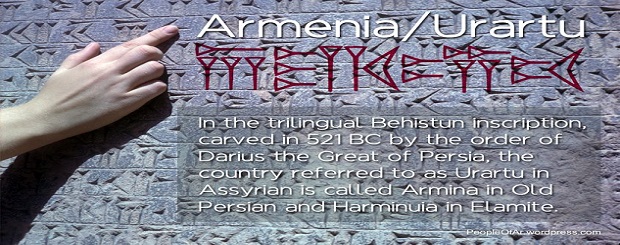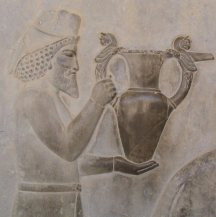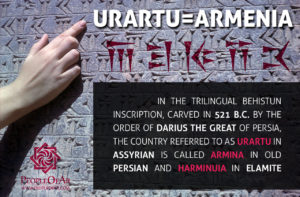
PeopleOfAr – Toponyms Armenia and Urartu – Toponyms Armenia and Urartu – Toponyms Armenia and Urartu – Toponyms Armenia and Urartu
DECEMBER 27, 2013
Armenia and Urartu are synonymous. In the trilingual Behistun inscription of Darius the Great (c.520 BC), the Babylonian toponym “Urashtu” appears in Old Persian as “Armina,” and in Elamite as “Harminuia,”corresponding to modern “Armenia.” [1] [2] In Hebrew (as recorded in the Bible) this land was called Ararat. The toponym “Urartu” emerged as a regional description rather than ethnic. Historian Boris Piotrovsky argued that “the Assyrian name of Uruatri [which gave birth to the Urartu toponym] had no ethnic significance but was most probably a descriptive term (perhaps meaning “the mountainous country”).”[3] In the Babylonian chancelleries the name of Urartu (under its Babylonian form, Urashtu) continued to be used, while simultaneously in old Persian it was called Armenia. [4] As Assyrian language gradually disappeared from historic records (after decline of Assyria and rise of Media) so did the toponym Urartu ceased to be used. [5] Instead only the name Armenia survived henceforward in the annals of history.

As Herodotus tells us, a decisive part was played by the arrival of a large Scythian army led by Madyes, son of Protothyes (the Partatua of the Assyrian sources). The last Assyrian king, Ashur-uballit, was compelled to withdraw to Harran, where he managed to hold out until 610 B.C.; then in the year 605, after the fall of Carchemish, the Assyrian kingdom ceased to exist. [6] And thus “Urartu” has not been recorded as such in Assyrian sources anymore. The name of Urartu is mentioned for the last time in a document of the time of Darius II (c. 415 B.C.).[6] By then the Armenian Orontid dynasty has already been well established since c.a. 553 BC. Thus Urartu in these records again, undeniably, refers to Armenia. The disappearance of “Urartu” from records merely signifies the disappearance of its exonym, not the country, as various nations continued to call Armenia with different names only dropping certain toponyms when the usage of these languages shifted or disappeared. Thus during Persian dominance Urartu lived on as a satrapy, and later as an independent kingdom simply known as Armenia. [7]
There can be no doubt about the way Urartu, Urashtu, Ararat, Armenia and Harminuia, have been used in the antiquity; simply as synonyms. Hence, there are no records of any invading Armenians into Urartu, there are no records of any power struggles or outside invasion of (the sometimes) supposed ‘Armen’ tribes, simply because these events never occurred. No such records from Assyrian, Babylonian or even Urartian sources. Such a powerful geopolitical shift would have certainly been noticed and recorded. Instead, Armenia and Urartu have been used as synonyms side by side as the aforementioned records clearly demonstrate that toponyms Urartu and Armenia are synonyms for the same country.

Sources:
1) Jona Lendering, The Behistun inscription
http://www.livius.org/be-bm/behistun/behistun-t15.html#2.29-37
2) Potts D. T. (2012), A Companion to the Archaeology of the Ancient Near East
3) The Ancient Civilization of Urartu, translated from Russian by James Hogarth (N.Y., 1969)
http://rbedrosian.com/Ref/Piot/uh2.htm
4) John Boardman, I. E. S. Edwards, N. G. L. Hammond , E. Sollberger (1982),The Cambridge Ancient History, Vol. 3, Part 1: The Prehistory of the Balkans, and the Middle East
5) Gevork Nazarian (http://www.armenianhighland.com/)
6) The Ancient Civilization of Urartu, translated from Russian by James Hogarth (N.Y., 1969)
http://rbedrosian.com/Ref/Piot/uh5.htm
7) http://www.livius.org/arl-arz/armenia/urartu.html
www.peopleofar.com/2013/12/27/toponyms-armenia-and-urartu/
